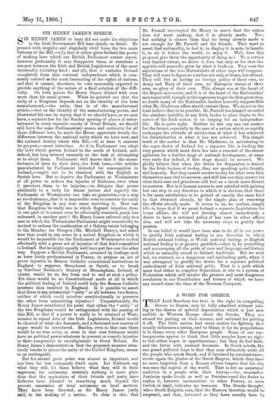A WORD FOR GREECE.
THAT Lord Rosebery has been in the right in compelling Greece to disarm, may be fully admitted without join- ing in the chorus of spiteful depreciation which is just now audible in Western Europe about the Greeks. They are abused for putting on their armour, and satirised for putting it off. The little nation had every motive for fighting that usually influences a nation, and to blame it for its preparations is to blame every other European people. Some of our con- temporaries appear to think that little peoples have no right to feel either hopes or apprehensions ; but they do feel both, and the latter with unusual keenness. In Greek minds, the one grand political hope is that they may ultimately unite all the people who speak Greek, and if favoured by circumstaneee, revive again the glories of the Greek Empire, which they have no more forgotten than a Roman citizen forgets that his city was once the capital of the world. That is not an unnatural ambition in a people with their history—for, remember. Justinian spoke Greek as well as Pericles—and the desire to realise it, however inconvenient to other Powers, or even foolish in itself, indicates no baseness. The Greeks-thought, when South Bulgaria rose, that the Eastern Question would be reopened, and that, favoured as they have usually been by
England and France, they might liberate their brethren in Epirus, Macedonia, and the islands from a tyranny the nature and horrors of which Western Europe scarcely understands. If insurrection were ever justifiable, it is justifiable in the Greek provinces of Turkey ; and the Greeks, in calling their whole population to arms and risking national bankruptcy, were, in their own eyes at least, and we confess in ours, obeying a peremptory call of duty. Their fault was in not fighting at once avowedly as liberators, instead of waiting for a pack of intriguers. More- over, they had another motive, which in the old diplomacy of Europe used to be considered amply sufficient, and which, whether sufficient or not, presses on their minds with quite unusual force. Because so many of their compatriots are still enslaved, their little free State, now very orderly and, as
we see, quite obedient to its Government, is being reduced to the position of an enclave. Greeks no more love Slays than
Italians love Teutons, and the Slav wave is rising all round them, and threatening their existence. The Austrian Emperor, who, be it remembered, is the second Slavic Sovereign in the world, thirsts for Salonica ; and if he got it, would reduce Greece to a petty dependency of Vienna. It would be impossible for her to live without courting the Hapsburgs, even if she could refrain from en- tering their dominion, and so obtaining for her children grand careers. The Servian King, also a Slav, threatens Macedonia on the North ; while the Prince of Bulgaria, who rules Slays, claims all that province except the coast, and is the probable heir of Constantinople, which will then be lost to the Greeks for ever. The Greek people feel as if they were being drowned, and as if their last chance of becoming an independent people strong enough to hold their own, were passing away before their eyes. Under such circumstances, with insur- rection expected in the Greek provinces, with a firm belief that they could defeat the Turkish fleet, and with a certainty that if beaten by Mussulmans, the Czar, as head of the Orthodox Church, must protect them, it is no matter for surprise that they listened to a Minister who told them that the hour had arrived, that be had secret allies—which was probably true— and that they must do as the Bulgarians had done, and win a pitched battle in the field. We only wonder that they did not go on, risk everything, and compel Europe to redistribute European Turkey, even if the redistribution had brought them no advantage. They did not, however, fight, and they are now sneered at for receding. Perhaps they should have fought ; but it is hard to ask a little State to fight against such awful odds.
Europe had pronounced against them, and even if they won Epirus and Macedonia, they could not keep those provinces without the European consent. Their hopes of winning greatly depended upon the diversion which their fleet could create on the Asiatic coast of Turkey, and their fleet was paralysed by the opposition of the maritime Powers. The concert of Europe might be imperfect, but England, Germany, and Austria were in earnest, and before their fleets the mari- time resources of Greece were hopelessly outmatched. The Duke of Edinburgh, who is a German Prince as well as an English one, would have sunk the Greek men-of-war, if they had threatened Smyrna, without a scruple. The mere hostility of the Powers depressed their people, while the blockade embarrassed a Treasury already emptied by the preparations for war. Above all, the European consensus influenced the King, who quietly strove for peace, and whose lukewarmness was fatal to the idea of fighting a land war, and leaving Europe to do its worst. Only a people in despair, or blind to the facts, would have ventured to risk all ; and it is the defect as it is the claim of Greeks, that they see unpleasing facts too clearly, and have in them something of the patience which prevents at once despair and heroism. They are not to be blamed for qualities which they cannot alter, any more than for the hopes which they cannot forego, or the fears which they cannot but entertain ; and they ought to be exempted from the malignant scoldings which add such bitter- ness to their political defeat. They have acted as most peoples in their situation would act, and it is as unfair to expect from them a self-restraint which no other nation in the Balkan shows, as to demand of them a heroism of self-sacrifice which their very intelligence and growing education forbid them to display. They will suffer terribly for their own miscalculations, and they have the same claim upon Europe that they always bad,—that of being the race in Eastern Europe with most in- tellectual capacity for modern life. Success, probably, will go to the Bulgarians, who fight ; but Greece mastered Rome once after she had been conquered, and may master the Slav yet, after she has seemed to be absorbed.



































 Previous page
Previous page